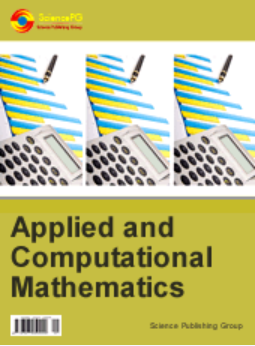Error Approximation of the Second Order Hyperbolic Differential Equationby Using DG Finite Element Method
IF 4.6
2区 数学
Q1 MATHEMATICS, APPLIED
引用次数: 0
Abstract
This article presents a simple efficient and asynchronously correcting a posteriori error approximation for discontinuous finite element solutions of the second-order hyperbolic partial differential problems on triangular meshes. This study considersthe basis functions for error spaces corresponding to some finite element spaces. The discretization error of each triangle is estimated by solving the local error problem. It also shows global super convergence for discontinuous solution on triangular lattice. In this article, the triangular elements are classify into three types: (i) elements with one inflow and two outflow edges are of type I, (ii) elements with two inflows and one outflow edges are of type II and (iii) elements with one inflow edge, one outflow edge, and one edge parallel to the characteristics are of type III. The article investigated higher-dimension discontinuous Galerkin methods for hyperbolic problems on triangular meshes and also studied the effect of finite element spaces on the superconvergence properties of DG solutions on three types of triangular elements and it showed that the DG solution is O(hp+2) superconvergent at Legendre points on the outflow edge on triangles having one outflow edge using three polynomial spaces. A posteriori error estimates are tested on a number of linear and nonlinear problems to show their efficiency and accuracy under lattice refinement for smooth and discontinuous solutions.利用 DG 有限元法对二阶双曲微分方程进行误差逼近
本文针对三角形网格上二阶双曲偏微分问题的非连续有限元解,提出了一种简单高效且异步修正后验误差的近似方法。本研究考虑了与某些有限元空间相对应的误差空间的基函数。通过求解局部误差问题来估计每个三角形的离散化误差。它还显示了三角形网格上不连续解的全局超收敛性。本文将三角形元素分为三类:(i) 具有一个流入边和两个流出边的元素为 I 类;(ii) 具有两个流入边和一个流出边的元素为 II 类;(iii) 具有一个流入边、一个流出边和一个平行于特征的边的元素为 III 类。文章研究了三角形网格上双曲问题的高维度非连续 Galerkin 方法,还研究了有限元空间对三种三角形元素上 DG 解的超收敛特性的影响,结果表明,在有一个流出边的三角形上,使用三个多项式空间,DG 解在流出边上的 Legendre 点具有 O(hp+2) 的超收敛性。在一些线性和非线性问题上测试了后验误差估计,以显示其在光滑和不连续解的网格细化下的效率和准确性。
本文章由计算机程序翻译,如有差异,请以英文原文为准。
求助全文
约1分钟内获得全文
求助全文
来源期刊
CiteScore
8.80
自引率
5.00%
发文量
18
审稿时长
6 months
期刊介绍:
Applied and Computational Mathematics (ISSN Online: 2328-5613, ISSN Print: 2328-5605) is a prestigious journal that focuses on the field of applied and computational mathematics. It is driven by the computational revolution and places a strong emphasis on innovative applied mathematics with potential for real-world applicability and practicality.
The journal caters to a broad audience of applied mathematicians and scientists who are interested in the advancement of mathematical principles and practical aspects of computational mathematics. Researchers from various disciplines can benefit from the diverse range of topics covered in ACM. To ensure the publication of high-quality content, all research articles undergo a rigorous peer review process. This process includes an initial screening by the editors and anonymous evaluation by expert reviewers. This guarantees that only the most valuable and accurate research is published in ACM.

 求助内容:
求助内容: 应助结果提醒方式:
应助结果提醒方式:


